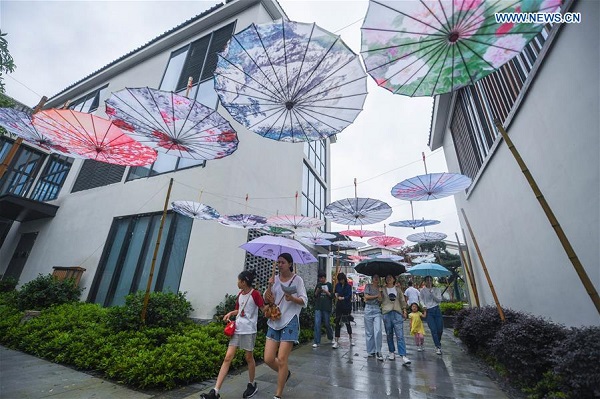Zhejiang targets 'minimum' 5% GDP growth at provincial people's congress

People visit intangible cultural heritage museums at Pingyao ancient street in Hangzhou, capital of East China's Zhejiang province. [Photo/Xinhua]
East China's Zhejiang province will achieve a minimum GDP growth rate of 5 percent in 2023, said Wang Hao, the provincial governor, on Thursday.
In 2023, the expansion of the province's general government revenue and the increase of the income of its urban and rural residents will keep pace with economic growth, Wang said, while the rise in inflation will be kept below 3 percent, and urban unemployment below 5 percent.
Wang announced the targets while delivering the government work report at the annual session of the Zhejiang Provincial People's Congress, which opened on Thursday.
"In 2022, Zhejiang withstood unexpected shocks and challenges," Wang said. "It is estimated that the GDP of the province for 2022 expanded by about 3 percent, and the per capita disposable income of urban and rural residents grew by 4.1 percent and 6.6 percent, respectively."
In the report, it was noted that the added value of industrial enterprises above designated size in Zhejiang in the past year increased by about 4.3 percent. To strengthen the confidence of market entities, over 400 billion yuan ($59 billion) in tax breaks and tax exemptions were provided, and government subsidies worth more than 108 billion yuan were handed out.
A campaign to "send 1,000 business delegations and 10,000 companies to explore the international market" has been launched to stimulate foreign trade and investment, with the province's import and export estimated to have grown 13 percent year-on-year during the past year.
For 2023, Zhejiang will continue to focus on economic recovery, according to the report.
Priorities will be given to further stimulate and expand consumption, especially fostering new types of consumption, and to attract foreign investment and expand the international market.
In the work report, Wang outlined Zhejiang's major goals for the next five years.
By 2027, the province will work toward a target GDP of 12 trillion yuan, with its per capita GDP reaching 170,000 yuan and per capita disposable income reaching 85,000 yuan. In particular, per capita disposable income of rural residents is expected to reach 55,000 yuan, and the income ratio between urban and rural residents is expected to further narrow, dropping to lower than 1.9.
Total investment in R&D will be over 3.4 percent of GDP by then, Wang said, with the added value of industrial enterprises above designated size exceeding 3 trillion yuan and the added value of the digital economy exceeding 1.6 trillion yuan, laying a solid foundation for Zhejiang's modernization efforts and its realization of common prosperity.
In May 2020, Zhejiang was designated as a demonstration zone for common prosperity, which calls for a more equal distribution of wealth among its residents and a more balanced development between its developed and poor areas.



